Acute Hepatitis C: What You Need to Know
If you’ve heard the term “acute hepatitis C” and wonder if it’s something serious, you’re not alone. It’s a short‑term infection of the liver caused by the hepatitis C virus (HCV). Most people catch HCV through blood contact – think sharing needles, unsafe tattoos, or rarely, medical procedures that didn’t follow strict hygiene. The good news is many cases clear up on their own, but some turn into chronic infection that can damage the liver over years.
Symptoms and Diagnosis
Acute hepatitis C often shows up with vague signs. You might feel tired, have a fever, or notice yellowing of the skin and eyes (jaundice). Some people get stomach pain, loss of appetite, or dark urine. These symptoms can look like a flu, so they’re easy to miss. If you think you’ve been exposed to HCV, doctors will order a blood test for HCV antibodies. A positive result is followed by a PCR test that looks for the virus itself. This two‑step approach tells whether the infection is new (acute) or long‑standing.
Because early symptoms are mild, many folks don’t get tested until weeks later. If you’re at risk – for example, you’ve used injectable drugs, received a blood transfusion before 1992, or had unsterile tattoos – ask your doctor for the test even if you feel fine. Early detection lets doctors monitor the virus and decide quickly whether treatment is needed.
Treatment Options and Prevention
When acute hepatitis C is caught early, some doctors adopt a “watch‑and‑wait” strategy because up to 25 % of people clear the virus without medication. During this time they run repeat PCR tests every few weeks. If the virus stays, modern direct‑acting antivirals (DAAs) are the go‑to treatment. A typical DAA course lasts 8‑12 weeks and can cure over 95 % of cases with minimal side effects. Starting therapy early reduces the chance of chronic liver damage.
Prevention is all about avoiding blood exposure. Use new, sterile needles if you inject drugs, get tattoos from reputable studios that follow safety rules, and never share personal items like razors or toothbrushes that might have blood. If you’re getting a medical procedure, ask the clinic about their infection‑control policies. There’s no vaccine for hepatitis C yet, so staying aware of risk factors is your best shield.
Bottom line: acute hepatitis C can feel harmless at first, but it deserves attention. Get tested if you think you’ve been exposed, follow up with your doctor on repeat tests, and consider DAA therapy if the virus sticks around. With quick action you can avoid a lifelong liver problem and get back to feeling normal.
The role of sofosbuvir in treating acute hepatitis C infection
In my recent research on acute hepatitis C infection treatments, I discovered that Sofosbuvir plays a crucial role in combating the virus. As an antiviral medication, it works by inhibiting the replication of the virus, ultimately aiding in the elimination of the infection. Clinical trials have demonstrated its efficacy, often showing promising results when used in combination with other medications like ribavirin or ledipasvir. Not only is Sofosbuvir well-tolerated by most patients, but it also significantly reduces the risk of chronic hepatitis C development. Overall, Sofosbuvir has become an essential component in the fight against acute hepatitis C infection, offering hope for improved patient outcomes.

